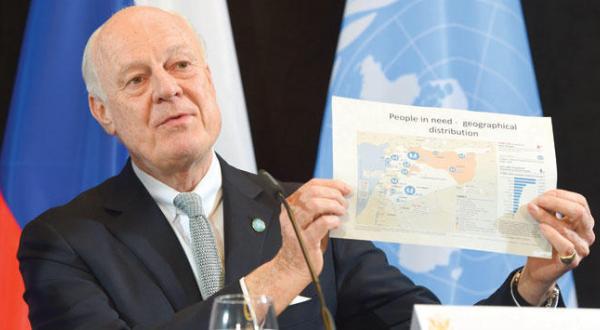
The UN envoy to Syria Staffan de Mistura displays a map of Syria during a press conference in Munich yesterday (AFP)
The US Secretary of Defence Ashton Carter yesterday said that more than 90% of countries in the international coalition against ISIS pledged to increase their military and non-military contribution to defeat the terrorist organisation at the meeting of the international coalition’s defence ministers held in Brussels on Thursday. He added that Poland, Romania and Denmark pledged to carry out strikes and send training missions.
Carter said that he spoke to the Saudi Defence Minister Prince Mohammed bin Salman about troops on the ground participating in the training of military and police forces in Iraq and providing logistical support in the city of Ramadi which is the capital of the Anbar governorate. He refused to reveal details of the missions that ground forces pledged by Riyadh to participate in the war against ISIS will undertake, and added that the United Arab Emirates (UAE) has agreed to send special operations forces to Syria to help train local Sunni forces to regain control of the city of Raqqa.
Carter did not refer to the size or number of the UAE’s special forces and only said that those forces will be part of efforts led by the US, Saudi Arabia and the rest of the countries in the coalition to empower local forces, overthrow ISIS and expel it from Mosul and Raqqah.
Meanwhile, the Saudi Foreign Minister Adel Al-Jubeir said at the Munich Security Conference yesterday that Saudi Arabia “is working to bring about political change in Syria and to isolate the person responsible for killing and displacing Syrians; a person who is attractive to terrorists and extremists” referring to the President of the regime Bashar Al-Assad. Al-Jubair added that the fertile environment of ISIS in Syria will disappear with the departure of Assad.
In a related development, the Syrian opposition expressed its reservations about the agreement reached by the major powers in Munich yesterday on the cessation of hostilities in Syria. The US Secretary of State John Kerry said that the 17 countries participating in the meeting agreed to “stop the fighting across the country within a week”. The Syrian opposition considers the Munich agreement to be a “manoeuvre” and warned against this matter being reversed, like any earlier decision, to serve the regime’s interests.
